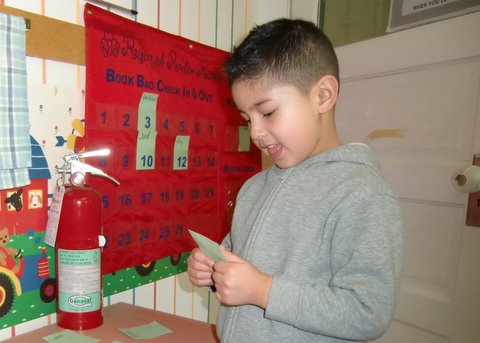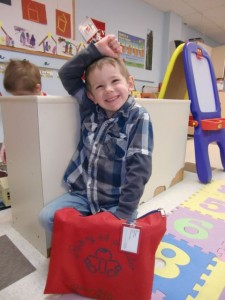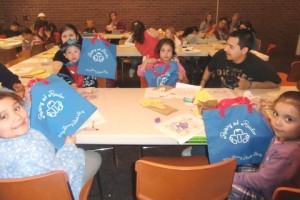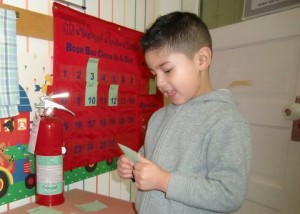
By Jennifer Crain
 Everyone knows that books are great for preschoolers, right? The problem, experts say, is getting families to read together once they have them at home.
Everyone knows that books are great for preschoolers, right? The problem, experts say, is getting families to read together once they have them at home.
There is plenty of evidence that reading books together during a child’s early years is the key: research has shown, time and again, that reading aloud to children helps build “skills essential for reading success.” That is, kids enter school ready to learn how to decipher words on the page.
But families with low incomes or limited English-speaking skills may find it difficult to read aloud to their kids or cultivate family reading routines when barriers such as long work hours or a lack of books in the house keep them from doing so.

But a program that aims to shore up home reading habits is proof that change can happen. The Raising A Reader program has served over a million children and families nationwide since it started in 1999. Kristin Gomez manages the Olympia affiliate program which serves 1,200 of those kids, including about 240 children in Thurston County.
She says the program’s multi-pronged approach makes it successful.
“Giving kids books is a good thing, period,” she says. “But it’s how you do it and how you support it that makes this program different.”
The program is run locally through the Child Care Action Council (CCAC) and funded through the group’s Warm Hearts Fundraiser, The United Way of Thurston County and the Discuren Charitable Foundation. The program has helped preschoolers and their families settle into good home reading habits for eight years.
Now in its eighth year locally, Raising A Reader loans books to children ages birth through five in preschools, targeting low-income populations and families with limited English-speaking skills. Every week of the academic year kids take home a bright red bag with four new, age-targeted, high quality, multicultural books inside. Gomez says the books are for home only, creating anticipation for the kids – the feeling that these books are special.
But even if kids are excited about hearing a story, how does a single parent working a ten-hour shift manage to serve dinner every night, get the kids to bed on time and…read?
“Book cuddling,” a daily time for parent and child to sit together and read a book, is the strategy promoted by Raising A Reader to overcome obstacles such as these.

Gomez explains that reading readiness “isn’t teaching your child how to read. It’s just sitting down, even if you don’t read the words.”
The program also supports parents through education events at each of the 14 area sites and provides home support such as a take-home video and printed suggestions on reading strategies.
Non-English-speaking parents face particular challenges so the national program has adopted books in nine languages, including some books with text in two different languages.
Gomez says the program loops preschool teachers into the effort as well. Teachers are provided with a guide that includes curriculum ideas, information on brain development and ideas about how to communicate with students and their parents.
The celebration of books, parent education and teacher support creates a reading network around each child that’s been shown to skyrocket their chances of becoming successful readers.
Studies show a 75% increase in the number of participating parents who share books with their kids five or more times per week. Head Start children who participated in Raising A Reader have tested twice as high on some reading-related skills as Head Start children who didn’t. And library visits have leaped – they’ve seen an 86 percent jump in the percentage of parents taking their children to the library at least once a month and among Spanish-speaking populations, frequent library visits have increased by more than 300 percent.

Though the primary goal of the program is to create students who are engaged with the written word and ready to learn to read when they enter kindergarten, Gomez says the long-term impact may go far beyond these milestones. Parents are learning conversation skills that lead to an increased vocabulary, an indicator of future academic success. And CCAC Executive Director Annie Cubberly says research even supports the idea that investing in early learning leads to safer communities.
Asked what the public can do to support early literacy, Cubberly says donations and volunteer time can make a huge difference.
One hundred dollars is enough to fund one child’s full experience in the program for a year, she says. And volunteers could help them expand the program to serve more kids in outlying schools.
Gomez says parents everywhere can employ strategies that encourage a love of reading in their own homes. Try asking kids to tell you about the book’s cover, for example, or dwell on a page, even if you don’t read all the words. Try stopping in the middle of a story and ask your child to predict what’s going to happen next.
At the end of the year, students receive their very own blue bag for toting books home from their local libraries. But the real take-home goes beyond something they can hold: the kids are excited to learn, which means they’re already walking down the a path of literacy that will help them succeed as students and citizens.
Connect with the Child Care Action Council on their website, or follow them on Facebook or Pinterest.



















































